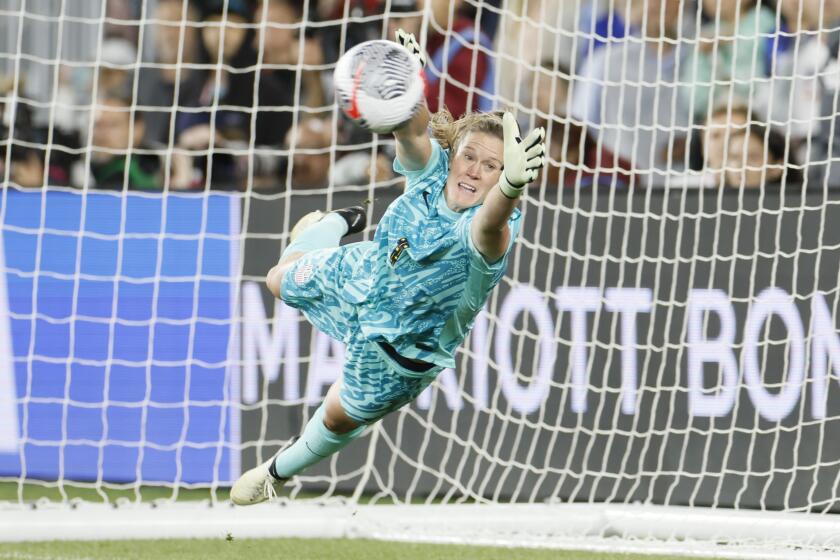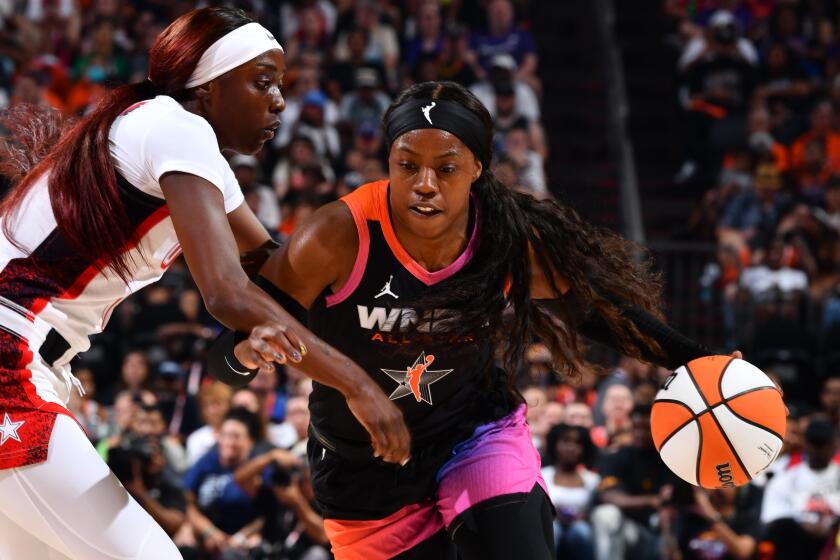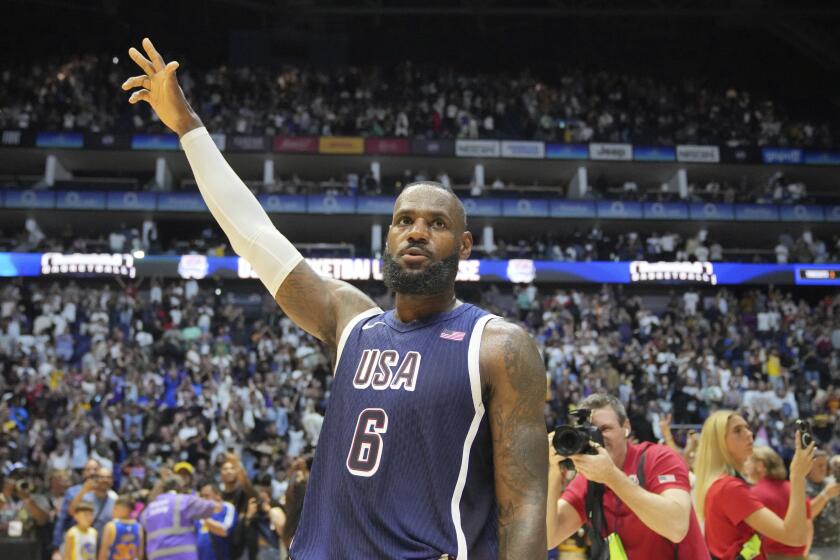Lieberman Wants One More Run Down Court : Basketball: She covets one of the 56 tryout invitations for the U.S. Olympic women’s team.
Nancy Lieberman’s indoctrination into international basketball went something like this:
During a qualifying tournament in Hamilton, Canada, before the 1976 Summer Games, a sharpshooting Bulgarian guard was unstoppable, and the U.S. women were on the verge of losing an Olympic berth.
In desperation, Coach Billie Moore sent Lieberman into the game with instructions.
“When she gets the ball in the corner, I want you to go after her as hard as you can, distract her, but when you get to her, jump to the side,” Moore told Lieberman, at 17 the team’s youngest player.
Within minutes, the Bulgarian guard got the ball in the corner and prepared to shoot. Lieberman raced toward her, jumped as high as she could and . . .
“My knees hit her in the center of her chest,” Lieberman recalled.
The blow left the Bulgarian sprawled behind the gym bleachers, unable to finish the game. Lieberman timidly walked over and looked down at what she had done. On the sideline, Moore was screaming, “I told you, ‘To the side!’ ”
The United States beat Bulgaria by a point and qualified for the Montreal Olympics, where it won a silver medal.
“People ask, ‘What did you do in the Olympics?’ ” Lieberman said. “I tell them, ‘Oh, I had a big hand in the U.S. (succeeding).’ ”
Moore knew what she was doing in using Lieberman in cameo roles in 1976. Lieberman had terrorized U.S. national team practices since she was a 16-year-old from Far Rockaway, N.Y.
Bouncing around the court like a pinball, Lieberman was good at knocking down teammates.
Moore said that Lieberman eventually learned to channel her energy and became perhaps the best female player of her era.
“She was a survivor,” said Moore, UCLA’s veteran coach.
Lieberman survived the playgrounds of Harlem and a tough childhood in becoming one of the world’s best known players.
Along the way, she survived coaching turmoil at Old Dominion University and helped the Norfolk, Va., school win two national championships. She survived criticism for leaving the 1980 Olympic team after the U.S.-led boycott to be the star of women’s professional leagues. And she survived the notoriety of a public relationship with Martina Navratilova and rediscovered her love of basketball.
At 33, Lieberman wants to put an exclamation mark on her athletic career with an appearance in the 1992 Olympics in Barcelona. She will learn Sunday after the NCAA women’s championship at the Sports Arena whether she is one of 56 women invited to the U.S. Olympic tryouts in May. If she is, and somehow earns one of 12 positions, she will be both the youngest and oldest woman to have made a U.S. Olympic women’s basketball team.
Chances of attaining such a distinction are remote.
If Lieberman fails, she will go to Barcelona as a television commentator.
“I want to make this Olympic team badly, but you know what? If I don’t, it is OK because nobody can take away from me what I have or what has happened,” Lieberman said.
She said one reason for trying is to show young players that women can continue in a sport that has been short on longevity. But really, this is about Lieberman more than anything else.
After parting ways with Navratilova and the glamour of Grand Slam tennis in 1984, Lieberman returned to the sideshows of sports. She competed in a now-defunct women’s professional league, the men’s United States Basketball League and as a player with the Washington Generals, the luckless foils of the Harlem Globetrotters.
She married one of the Generals, Tim Cline, and after leaving the team, worked in broadcasting.
Then came a realization. After spending time with the 1988 U.S. team in Seoul as a television analyst, she believed she had the talent to continue playing internationally.
“I said, ‘Tim, I know that I can make the team,’ ” Lieberman said. “He just looked at me one day and says, ‘Why don’t you try? Why talk about it?’ ”
She returned to their Dallas base, hired a trainer and started preparing. As a former professional, she was ineligible to compete in 1988 because of rules on amateurism.
But attitudes on money were rapidly changing, and by April of 1989, international basketball officials announced that professionals could play in the Olympics.
Lieberman heard the news on the radio while driving on a Dallas expressway. She stayed on course long enough to make the U.S. team that summer, helping it earn a berth in the 1990 World Championships at a qualifying tournament in Brazil. In 1990, she was cut from the Goodwill Games team during tryouts and did not participate internationally.
“It was hard for me, because I have never, ever been cut before,” Lieberman said.
Instead of trying for the Pan American Games team last summer, Lieberman had elbow surgery. She did not want U.S. coaches to think of her as a washed-up, sore-elbowed player when petitioning for a chance to try out this summer.
But receiving one of the 56 invitations will be difficult, considering commitments to former national and junior national team members. Lieberman will be competing for a tryout spot with college players who are the United States’ future.
Many of America’s elite women play in Europe or Japan, some earning six-figure salaries. Lieberman makes her living from promotions and endorsements. She would rather stay with her husband in Dallas than play abroad nine months a year. Thus, she trains hard and competes in a men’s league in town.
The selection committee probably will not be sympathetic to her situation. A good scoring average in a men’s pro-am league simply is not impressive to the standard-bearers of USA Basketball.
“Every point guard in the world will be trying for it this summer,” said Susan Blackwood, head of the Women’s Games Committee for USA Basketball. “It is going to be tougher.”
Moore marveled at the talent assembled last year before the Pan American Games. The players, she said, were rich in international experience.
“No matter how much you work out, no matter how many pick-up games you play in, you can never simulate . . . actual competition,” Moore said.
Cline, who has immersed himself in the women’s game since his marriage four years ago, hopes his wife will not be overlooked because of prevailing attitudes.
“You can play with all the wonderful females players in the world, but when you start playing college-level male players, it is a whole different ballgame,” he said.
The differences might be a disadvantage for a point guard of Lieberman’s stature. Recreational leagues tend to emphasize offense in an unstructured atmosphere. Instead of simply whipping her trademark passes, Lieberman must be able to drive past women. That takes the kind of quickness not seen in her era of the mid-to-late ‘70s.
If the action proves too fast, too strong, Lieberman will have to look elsewhere for a competitive outlet.
For all of those who remember the young redhead whirling around the court, it will be a disappointment. Lieberman’s name is painted on the canvas of women’s basketball like few others.
She recently published an autobiography, “Lady Magic.” Lieberman said she rejected big offers to write a book about her highly publicized three-year relationship with Navratilova. Instead, she wanted to offer an account of her life.
“She has had a lot of experiences outside that three-year window that everybody seems to be so concerned with,” Cline said.
Lieberman addressed her relationship with Navratilova, telling the tennis star there was no reason to protect their privacy once the Judy Nelson palimony trial publicly acknowledged their affair last year.
“If I lie about that, I’ll lie about other things, and I’m just not going to,” she said.
Lieberman and Navratilova remain friends. Lieberman testified at Navratilova’s trial, which recently was settled out of court, and Navratilova participated in tennis exhibitions Lieberman promoted.
The interest in their relationship, however, goes beyond personal involvement. “Team Navratilova,” with Martina, Lieberman and Renee Richards, became the dominating force of women’s tennis from 1981 to ’84. Navratilova credits Lieberman with giving her an unshakable resolve to win every match.
Lieberman said something had to give when she first accompanied Navratilova to a practice at the 1981 French Open. Lieberman described the session as a social outing. Navratilova warmed up a little, then hit some baseline shots and a few volleys, then went to the net to talk to Billie Jean King and Betsy Nagelsen. Then she stretched, hit a few more volleys, went to the service line, talked to the other players again and stretched.
That was it.
On the way home, the two stopped at some basketball courts because Navratilova wanted to learn to shoot a layup off her correct foot.
“I’m thinking, ‘She barely broke a sweat at practice, and now she is working her tail off to learn how to shoot a layup,’ ” Lieberman wrote. “I was astonished. How could shooting a layup be more important than preparing to play at Roland Garros Stadium in the French Open? We probably spent more time driving to and from practice than she had practicing.”
When Navratilova was eliminated in the quarterfinals by Germany’s Sylvia Hanika, Lieberman was in for another shock. Navratilova’s tonic for defeat was shopping.
“We made it home . . . after dropping about $15,000,” Lieberman said.
As Lieberman’s influence increased, Navratilova learned to concentrate on tennis. Lieberman became Navratilova’s full-time training partner, and Richards provided court strategy. It was one of the most successful combinations in women’s tennis.
By concentrating on Navratilova’s career, Lieberman said her basketball skills decreased appreciably. So, when the two parted, she began the arduous climb back.
She has earned some personal victories since then, but the desire to play has not lessened.
“Nancy is almost like Nolan Ryan,” said Michael Adams, the Washington Bullets’ three-point specialist who played with Lieberman in the USBL.
“She is never going to give it up.”
So it would seem. And Sunday she will find out if she gets one more chance.
More to Read
Go beyond the scoreboard
Get the latest on L.A.'s teams in the daily Sports Report newsletter.
You may occasionally receive promotional content from the Los Angeles Times.





